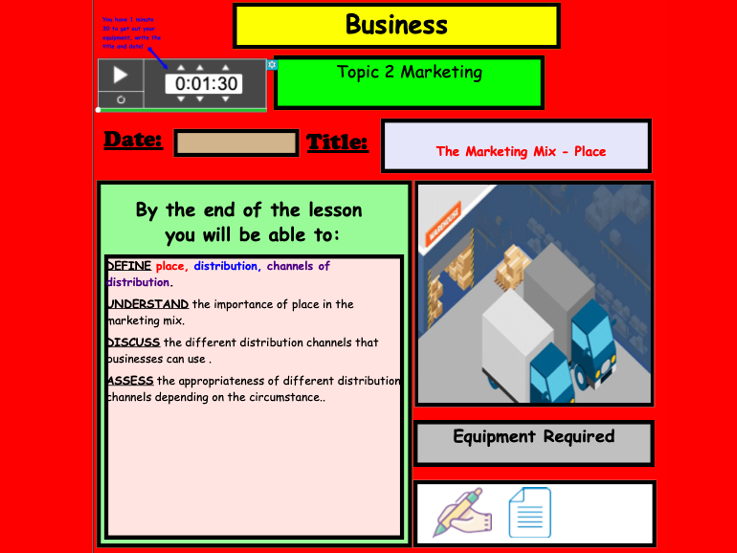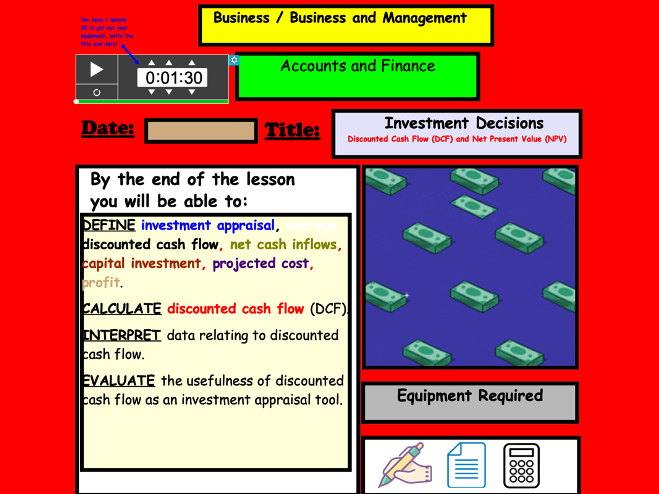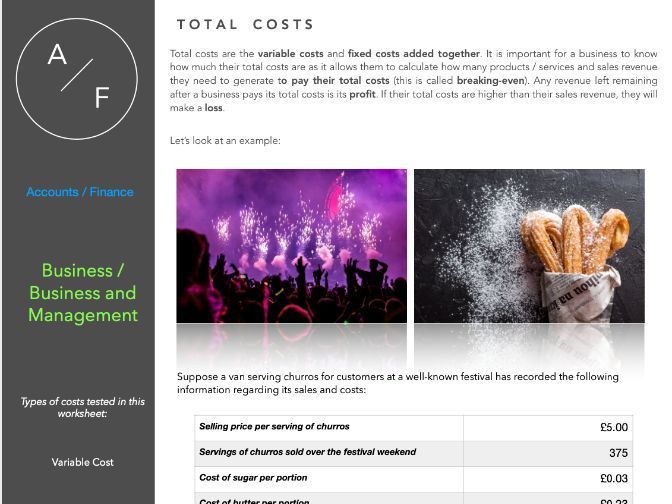84Uploads
11k+Views
6k+Downloads
Business and finance

Marketing Mix - Place
Included in this presentation:
A fun Catchphrase starter activity (my students love this!)
A recap activity on cost-based pricing strategies with answers (feel free to remove or skip if you are you to cover this)
Notes and examples on the different methods of distribution
Notes on the pros and cons of each method of distribution
Notes on the importance of selecting the most appropriate method of distribution

Depreciation (Business / Business Studies)
Description
A COLOURFUL, INFORMATIVE and ENGAGING presentation that on depreciation.
Included in this lesson:
A colourful and informative title slide that outlines the key skills covered in this topic, a list of equipment required, animated gif to grab the attention of students, and timing ‘prompt’ to get students to get the title down and equipment out as quickly as possible
A ‘guess the question’ starter activity where students are given the answers to ten questions relating to other Accounts / Finance related topics. Students need to work out what the ten questions were to get those answers. Answers are included in the presentation
An explanation of what the lesson aims are
An explanation of what assets are, contextualised to students
Informative, colourful and contextualised slides explaining what current and non-current assets, and depreciation are
A step by step guide to show how depreciation is calculated using the straight-line method, followed by an example for students to calculate (answers provided)
An explanation of the advantages and disadvantages of using the straight-line method to calculate depreciation
The same step by step guide, advantages and disadvantages for the reducing balance method
An exam style question where students need to calculate the value of depreciation, calculate how this affects the estimated value of an asset and when the right time to sell an asset it. Answers provided in the presentation with explanations
I’ve designed this lesson so that it can simply be opened and taught immediately. Each slide is self explanatory and easy to follow. There are 38 slides included in this lesson and it took me just under 2 hours to go through.

Net Present Value
Net Present Value is a topic that students often find challenging. This presentation has been produced so that students of all abilities can access the topic. Using lots of colour and engaging slides, contextualised examples as well as step by step examples, this presentation has proven to be very successful in getting my students to understand this net present value effectively.
Included in this presentation:
A detailed title slide including key skills covered in the lesson and equipment required
Initial starter activity where students need to calculate the payback period and average (accounting) rate of return. The aim of this activity is to get students to think about how using both of these methods can provide conflicting results (one investment option could have a shorter payback period where the other could have a higher average rate of return). Activity and answers included in slide, as well as explanation of how these figures were calculated.
Step by step guidance as to what the net present value and time value of money means (we look at why it is better to have £100 now rather than next year)
Activities that explain what inflation and interest rates are, and how they affect the value of money (guess the price activity can be done on mini whiteboards or completed as a class)
Step by step guide demonstrating how net present value is calculated
An explanation of how net present value can be applied to investment decisions
An evaluation of the usefulness of net present value, with examples provided.
This presentation contains 53 slides and took me just under 2 hours to go through in detail.

Sales Forecasting, Market Analysis Worksheet
This worksheet contains a range of sales forecasting and market analysis activities. All answers are included.
Included in this worksheet are activities on:
Market share
Interpreting bar charts
Scatter diagrams
Line of best fit
Extrapolation
Moving averages
Positive, negative or unrelated correlation

Demand and the Demand Curve
A PowerPoint presentation on demand includes:
Catchphrase starter activity
Demand activity (graph paper required)
Detailed explanations of demand, reasons for shape of demand curve, movements, shifts, ceteris paribus
This lesson took me 60 minutes to go through

Market Research
Colourful and interactive lesson on market research (primary and secondary).
The lesson is split into 3 parts. 2 lessons were spent on primary research, the third spent on secondary research.
Each part of the lesson contains a different starter activity (3 starter activities in total, with answers), including fill the blanks< Catchphrase and editable key term challenge.
PowerPoint contains videos, animations and a Mentimeter activity (you will have to have your own account to access this activity)
All activities are optional and most are editable.
77 slides in total and took me two hours to go through with my students.

Break-Even Analysis Worksheet
4 Practice break-even diagram questions with answers provided
Can be printed used in lessons or as revision

Cash Flow Forecast Full Worksheet
This worksheet tests students understanding of the importance of cash, cash flow forecasts and how to solve cash flow problems.
There are five activities included in this resource:
Activity 1 - A fill the blanks activity testing students’ understanding of key cash flow terminology
Activity 2 - A cash flow forecast with missing values that students will need to calculate
Activity 3 - A true or false activity that tests students’ ability to interpret the information from the cash flow forecast they completed for activity 2
Activity 4 - An anagram activity where students have to solve five anagrams of ways businesses can solve cash flow problems. Once solved, they need to briefly explain how each method helps with poor cash flow
Activity 5 - A picture round where students look at 9 good and services, and have to decide which four of the nine are likely to experience short-term cash-flow problems. A brief answer is required underneath explaining their reasons for each answer
All answers have been provided in depth
This can be completed in class / for homework / as a peer marked activity to save you marking!
This worksheet took students around 25 minutes to complete

Types of Costs WORKSHEET (Fixed, Variable, Total, Average, Marginal, Direct, Indirect)
This worksheet contains revision notes and activities on how to calculate fixed costs, variable costs, total costs, average costs, marginal costs, direct costs and indirect costs)
All answers are included
The worksheet is colourful and creative throughout
This worksheet contains 7 pages of activities and took my students between 30 - 45 minutes to complete
Can be given as classwork / homework / revision

Market Share
This presentation includes:
A colourful title slide with learning objectives and clickable timer to give students a minute and a half to get down the title
Detailed notes providing explanations of markets, market growth, calculation of market share, how market share increases as well as the benefits of high market share
3 mini activities; 1 - Calculating market share, 2 - Which markets are growing and shrinking in size 3 - Which business is the market leader in 4 different industries
This lesson took me 30 minutes to go through with my students

Business Location
A 20 slide PowerPoint presentation outlining the qualitative and quantitative factors businesses consider when choosing a business location.
The PowerPoint is colouful, informative and includes a ‘Tenable’ game show PowerPoint where students have to identify 10 common reasons why businesses fail

Types of Taxation (Direct and Indirect)
A colourful and detailed presentation that explores types of taxation. Included in this presentation:
A fun Catchphrase starter activity where students have to look at images to guess the name of a product or service (my students love this!)
An initial true or false quiz about types of taxes (England specific)
4 slides illustrating how much tax revenue the UK generates in comparison to other countries and how that tax revenue is spent. A sample payslip is also shown to illustrate some of the deducations are taken from income tax
Colourful and detailed examples of the main forms of tax students need to know about (income, corporation, VAT, National insurance, business rates)
A ‘how much income tax does Boris pay!’ activity that students love. It illustrates that income tax brackets are different at different thresholds of income
Disadvantages of taxation
Useful tips and notes as to how to evaluate a question that refers to taxation
This lesson took me an hour to complete

Capacity
Full lesson on capacity / capacity utilisation.
The resource includes:
A colourful title slide with animations, timer, detailed lesson objectives
Depreciation recap starter activity with answers
Contextualised examples of capacity
Capacity utilisation calculation activity with answers
Detailed notes on excess, full and over-capacity
Explanation of rationalisation

Business Growth (Business and Economics)
Complete resource that explores organic and inorganic growth as well as constraints on growth

Advertising, Media and Peer Pressure
A financial education lesson on advertising, media and peer pressure.
Included:
Colourful and interactive slides with timers, animations and videos
Activities (with answers) throughout
Worksheet included
Detailed notes
There are 37 slides in total and this lesson took me an hour and a half to go through

Eduqas A Level Business Exam Tech (Part 1)
This 55 slide resource covers key exam technique skills for Eduqas A Level Business.
Presentation is comprehensive with detailed explanations, examples, questions, mark schemes and links.

Fraud and Identify Theft
This is designed as a follow on lesson to my previous financial education lesson on advertising, media and peer pressure but can be taught as a standalone lesson.
Including in this lesson:
Guess the question starter activity
Explanations of types of fraud, such as phishing and vishing
Videos
Activities with answers

Advertising, Media and Peer Pressure
A financial education lesson on advertising, media and peer pressure. Colourful, engaging and informative throughout.

Critical Path Analysis
Included in this resource is a detailed, colourful, engaging and informative presentation on critical path analysis. I have broken this topic down in easy to understand sections as students often find it very challenging.
The PowerPoint contains:
A detailed and colourful title slide that includes all learning objectives
A fill the blanks recap starter activity on ratio analysis / financial statement. All answers are included.
An explanation of what project management is and its importance. Contextualised examples of projects applicable to critical path are included
**A hyperlink to a great video **of Apple’s new HQ is included. It shows the scale of the project, cost and time taken
An activity where students learn the importance of completing activities simultaneously to save time rather than a sequence
A step by step breakdown over 10 slides on what a network diagram is, what the values and characters mean, and how to work out EST, LFT, critical path.
5 network diagrams ranging in difficulty all with answers provided
Detailed notes and activities on float times
Notes on the advantages and disadvantages of critical path as well as how to evaluate the usefulness of critical path analysis as a planning tool
A separate supplementary worksheet is included in this resource with all of the activities included in the PowerPoint. These can be printed for students. All answer are in the presentation.
Animations have been used throughout to make this as engaging for students as possible
The presentation contains 52 slides and took me two and a half hours to go through with students.




















